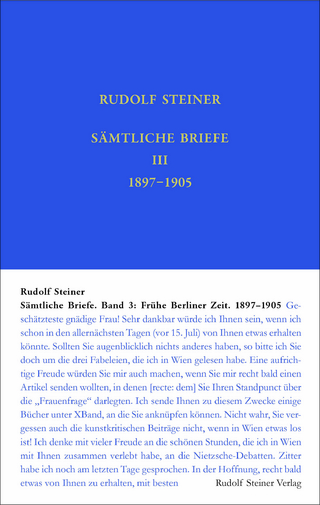Memory
Rudolf Steiner Press (Verlag)
978-1-85584-574-9 (ISBN)
Lese- und Medienproben
Rudolf Steiner’s research on memory, recollection and forgetting has many implications for the way we learn, for inner development and spiritual growth. This unique selection of passages from his works offers insights into how consciousness can remain autonomous and creative in a digital environment. It also provides ideas for improving education and emphasizes the importance of life-long learning.
Chapters include: ‘The Development of Memory Throughout Human History’; ‘The Formation of Memory, Remembering and Forgetting in the Human Individual’; ‘Remembering and Forgetting in Connection with Education’; ‘How Remembering and Forgetting are Transformed by the Schooling Path – Imagination and Inspiration’; ‘Remembering Backwards (Rückschau) and Memory Exercises’; ‘Subconscious Memories of the Pre-birth Period and of Life Between Death and a New Birth’; ‘Memory and Remembering after Death’; ‘The Development of Memory in the Future’.
Rudolf Steiner (1861-1925) called his spiritual philosophy “anthroposophy”, meaning “wisdom of the human being”. As a highly developed seer, he based his work on direct knowledge and perception of spiritual dimensions. He initiated a modern and universal “science of spirit”, accessible to anyone willing to exercise clear and unprejudiced thinking. From his spiritual investigations Steiner provided suggestions for the renewal of many activities, including education (both general and special), agriculture, medicine, economics, architecture, science, philosophy, religion and the arts. Today there are thousands of schools, clinics, farms and other organizations involved in practical work based on his principles. His many published works feature his research into the spiritual nature of the human being, the evolution of the world and humanity, and methods of personal development. Steiner wrote some 30 books and delivered over 6000 lectures across Europe. In 1924 he founded the General Anthroposophical Society, which today has branches throughout the world.
| Erscheinungsdatum | 03.09.2020 |
|---|---|
| Einführung | A. Neider |
| Übersetzer | J. Collis, P. King |
| Verlagsort | East Sussex |
| Sprache | englisch |
| Maße | 135 x 215 mm |
| Themenwelt | Weitere Fachgebiete ► Anthroposophie |
| ISBN-10 | 1-85584-574-1 / 1855845741 |
| ISBN-13 | 978-1-85584-574-9 / 9781855845749 |
| Zustand | Neuware |
| Haben Sie eine Frage zum Produkt? |
aus dem Bereich



